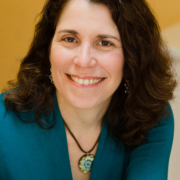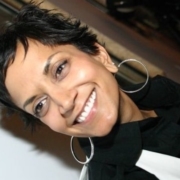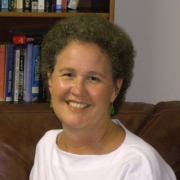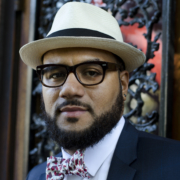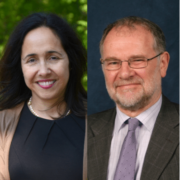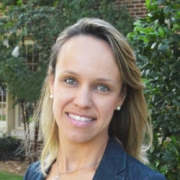Tio Hardiman
Racism and Police Violence in America
The murder of George Floyd has ignited a global outcry against racism and police violence. How can we understand the meaning of George Floyd while not forgetting Sean Bell, Oscar Grant, Kelly Thomas, Eric Garner, Michael Brown, Laguan McDonald, Antown Rose II, and Ahmaud Arbery to name just a few Americans killed for the color of their skin?
To help process the protests and riots, racism and police violence, I’ve invited back on the show my friend Tio Hardiman. We met in Chicago last year after I watched The Interrupters, a documentary that details his organization and its work trying to stop violence on the front end.
Tio Hardiman is president and founder of Violence Interrupters, Incorporated and an Adjunct Professor of Criminal Justice. He was active in the 2015 Chicago protests after Laquan McDonald was murdered by a police offer and has been active in the recent protests since George Floyds death.
Citation: Hardiman, Tio, interview with Will Brehm, FreshEd, 201, podcast audio, June 8, 2020. https://freshedpodcast.com/tiohardiman-2/
Will Brehm 2:07
Tio Hardiman, welcome back to FreshEd.
Tio Hardiman 2:10
It is an honor to be back with you here today.
Will Brehm 2:12
When did you learn about the death of George Floyd?
Tio Hardiman 2:17
When I learned about the death of George Floyd basically, I think about a couple hours right after his death had occurred. It like sent a shockwave here, through Chicago, because the actual video was released -the young lady that filmed the video. It was all over social media like almost immediately. And it was like it took the breath out of me, basically.
Will Brehm 2:39
And so, what has happened in Chicago since the release of that video, since people started realizing what happened in Minnesota?
Tio Hardiman 2:48
Well, first and foremost, I will say that when people watch the video, it took 8 minutes and 46 seconds to zap the life out of George Floyd and in Chicago, the city kind of went up. And what I mean by the city went up like in smoke, so to speak. And because a lot of people all over the city in Chicago acted like they were basically going crazy for a minute because nobody could understand what happened to George Floyd and why it happened to him. A lot of people were pissed off because you would think that somebody would have maybe at least thought about pushing the officer off of George Floyd because he had laid there calling for his mother telling everybody he could not breathe. And nobody would advocate violence against no police officers, that is not what we are talking about. But for one second in time, somebody should have, at least attempted, to draw the attention away from, you know, everything else and try to push that officer off of George Floyd’s neck and George Floyd would probably be alive today. So, that is a lot of the conversation -a lot of people were talking about it like that. And I will be honest with everybody that is listening to your podcast here. If I were present there, I would have helped George Floyd breathe. I could not sit back. It would have been my natural inclination as a man to help that brother breathe. It was not right. Maybe it would have been problematic. And like I said, I am not advocating violence, but just a mere measure of pushing that officer off the man’s neck, I think that would suffice. They may have hit me in the back of my head or something, or I might have got arrested but the thing about it is that -come on, man, it’s about saving a life. I believe I would have dropped everything on any individual that would have at least tried to help the young man.
Will Brehm 4:32
I guess this brings up a really interesting question. And the reason that I actually wanted to invite you on the show today is about this issue of violence and about, you know, when is an act of violence justified if ever. So, you’re saying that you would have somehow gotten that police officer off of the neck of George Floyd, even if that would have resulted in violence to yourself, if that would have meant violence from you on to the police officer. So, in this very supercharged, political, racial moment in America, and I must say that these issues have spread around the world. Just today people in London were doing a minute silence for George Floyd. So, how can we think about violence for someone that has thought about violence and has seen violence on so many levels inside communities, has tried to resolve conflict in very sort of intense ways let’s say, as we talked about in our last podcast. How do you make sense of some of the issues of violence that we see today in the protests and just generally when it comes to race in America?
Tio Hardiman 5:50
Well, you have to understand also see if George Floyd was a White person, or Asian, Hispanic or whatever the case may be. I believe that any grown man that believes in humanity would have pushed the officer off of that person’s neck. So, it is not so much about the race, even though it just happens to be a preponderance of evidence that African American men are the ones that are killed by predominantly white police officers here in the United States. That is what makes it so bad with the systemic racism and the systemic disrespect for a Black person’s humanity. So, when you talk about the riots, the looting and the demonstrations, you have three sets of people out there: you have peaceful demonstrators that are doing the best they can do just to raise their voices, which is always a good thing. You have some people in the crowd- the second layer is the people that want to become famous off somebody else’s tragedy, you know, just the hangers-on that will take the opportunity to participate in interviews, like they really organized something but they never did, they just join in to something that was already organized, so to speak. Then you have the third layer who are the looters and the people that riot in certain ways. I must say that in Minneapolis the police station was burned down immediately. That is the first time in the history something like that happened. That goes to show you that … the people out there are fed up; people are fed up. But I will say this much, it appears that outside agitators are behind some of the incidents that are taking place. Because I know my people -I am an African American man- I know my people quite well and basically all these fires that are kind of like pre-orchestrated fires that is something different for my community. I am not saying our people do not set fires, but we have had some intentionally well-structured and organized people setting fires and it seems a little different. So, the outside agitators come in and they cause a lot of mayhem and chaos. And let me just say this since we are on this subject matter: when Laquan McDonald was killed in Chicago, executed by the police, we organized many many, I’m talking about thousands of people came out on a regular basis in Chicago, we never once had any type of riots or looting. We took care of the business in a very peaceful but strong way, and an organized way, and as an end result, there’s been an 85% reduction in police involved killings of young Black men in Chicago because we stood unified. That is a difference and Chicago should be the model for the entire world and the nation because a lot of laws were changed in Chicago, since we really organized during the Laquan McDonald era.
Will Brehm 8:38
And so, Laquan McDonald was killed by police in 2015. And so, what you are saying is that there were reforms that took place inside the police department. What kind of reforms happened in the years since 2015 when Laquan McDonald was killed?
Tio Hardiman 8:55
Okay, good question. So, what happened is that now, there’s a dissent decree in Chicago and in the state of Illinois, where if officers are involved in any misconduct, they shoot somebody, automatically they’re taken off the streets for about 60 days and there’s an internal investigation, alright. Now, their body cameras have to be on all the time whenever they go out, dealing with the public, their body cameras must be on whenever they’re dealing with you know like a situation. Whenever they are dealing with anybody where they encounter people breaking the law, or whatever the case may be, their body cameras must be on, right. And so also, there has been a lot of changes in the police departments structure when it comes down to promotions of African American police officers, and minorities so to speak minority police has changed. The structure has changed. So, there is a lot. There is a dissent decree, people can look it up if you listen here. You can look it up online, the Chicago dissent decree with the Chicago Police Department. I remember it was not just because … see because of all the organized protests in Chicago also, the Department of Justice, they came to Chicago and conducted what you might say is a scathing evaluation and review of the Chicago Police Department and they found out that Chicago was one of the most corrupt police departments in the United States. And see people need to understand, I am not anti-police. I am only anti excessive force and police brutality.
Will Brehm 10:22
Right, right. And what is interesting is that in Minneapolis, the mayor has come out in the last few days, and has basically said, “we want to change the police system and structures, but we simply cannot do it”. And in fact, in Minneapolis, they have a police chief who sued the state for racial discrimination in the police force. And now he has been promoted to being a police chief. So, it seems like there are some serious structural issues in place even when a mayor and a police chief and obviously the public want to see change.
Tio Hardiman 11:05
Yes, see what happened. I like what the mayor in Minneapolis has done so far. He spoke out against what happened to George Floyd. And then now the other officers were arrested. And you had people standing on the streets, asking this guy, and telling him the man cannot breathe. He is dying over there. And the man is dying. And it seems like it just fell on deaf ears and basically, it is just straight up unacceptable any level in the world. You had a Black man that was being killed, people are able to watch his death, a slow death, across America. So, you had the mayor of Minneapolis, he stood up, but at the same time, the officer that pretty much gave the death blow by having his knee obstructing the airflow to George Floyd’s brain and heart and all that stuff, basically he had a lot of complaints in his background. So, I believe that the mayor of Minneapolis is going to do the right thing now moving forward to make sure that they check. See what needs to happen, I was pushing for two things: I was pushing for what you call citizens intervention law in which citizens can intervene when they see a police officer crossing the line. I am not saying advocating violence against the police. What I am saying is that something needs to give though. There needs to be -see the legislators need to tweak that law to make it work so everybody will be okay. Maybe like four, five, or ten citizens can hold the police or something until some higher-level officials get there. So, they can stop them from killing somebody like in the case of George Floyd. Another law that needs to be examined is the resisting arrest law. Because you can be locked up in Illinois and throughout the nation for resisting arrest, even if the arrest is unlawful. That law needs to be tweaked a little bit and looked at because a lot of African American men in particular are being locked up and some of these arrests are unlawful. And last but not least, I said this on the news the other day here in Chicago, there’s no evidence that dictates that Black men are a threat to the police in the United States. You cannot point to any type of data that will reveal that Black men are a threat to the police. So, why are white officers in particular killing Black men? It makes no sense. So, that is why we are standing up every way we can, and in peaceful ways just to kind of change some of these racist, systemic policies that have been around for almost 100 years.
Will Brehm 13:31
So, why do you think white officers are killing Black men to put it very bluntly? What are some of these underlying racist structures that enable such an environment to exist?
Tio Hardiman 13:46
You got to understand a blast from the past. Huey P. Newton, Bobby Seale, the original founders of the Black Panther Party for Self Defense. They dealt with this issue in the 60s. They dealt with this issue. Those guys were the vanguard of the community. You had white officers coming in Oakland, California beaten Black man up, killing them and everything. So, the Black Panther Party organized, and they were like a watchdog group of guys that would watch the police when they were arresting a Black person or trying to harm a Black person. So, I just want to salute Huey P. Newton. He is passed away now, but Bobby Seale is still around. Now this is the thing. The reason white officers are killing Black men is two reasons. One is that they have been able to get away with it for a long time. If you look at the evolution of policing in Black America, you have a lot of white officers -I have a lot of police officer friends. So, my thing is, I understand both ends. I am looking at both sides of the coin. The elephant in the room is that 100 years ago, you know the evolution of policing, you had some of the racist white people that ended up becoming police officers and becoming prosecutors and judges because they took the mask off their face, as far as the hoods, when they were racist with the Ku Klux Klan and all that kind of belief system and they became police officers. So, it was business as usual for them. And then by the Black community not being united like we should be -and let me clear this up. If the Black community was united as one, one community, one nation, here in the United States, not against the United States, but as one people then officers could not kill Black men because they would know that there’s some type of nation backing the Black men. But what I like seeing now is that basically white people, Asian people, Hispanic people, Black people are all unifying, across the world now, to make sure that the death of George Floyd will not go down in vain. That is a good thing. But you are talking about 100 years of discrimination, racism, excessive force, police brutality, so a lot of police officers feel like it is just the norm. See, the Black community is not an experimental laboratory for policing. All the police go and train in the Black community from the drug trade all the way to everything else to the gang violence. So, that is one of the reasons why. And over the years, whenever police were to kill an African American man, it was always the same story. The Black man had a gun, he was running, and we had to shoot him and kill him. There was a shoot to kill type of a code of silence when it comes down to the police killing Black men in particular.
Will Brehm 16:18
Do you think the George Floyd murder, and the aftermath, and the protests, and the International outrage that has ensued -do you think this is actually going to be a tipping point? Or will things sadly go back to normal?
Tio Hardiman 16:36
Yeah, I believe that George Floyd’s death will be a tipping point for sure, short term. Short-term tipping point. But as time goes on, things might go back to normal to a degree here and there because once the smoke clears, everybody gets past whatever they are dealing with, whatever their feelings may be, with George Floyd. And I know for a fact that a lot of sweeping changes will come to the world of law enforcement behind this, but that’s not going to change the mindset of some of the officers out there that feel like Black lives just don’t matter. You know, some people -you got to understand the real psychology of George Floyd’s death. You know, you got police officers out there, you had three police officers kneeling on the guy. Another officer holding the line, so to speak, standing on security, while a man, a human being, was saying that they could not breathe. You had the Eric Garner death. Everybody heard about what happened to Eric Garner when he was placed in the chokehold in New York. And so those police officers had no regard for life period. So, the reality is that yeah, I think there will be some immediate changes, but you are going to have some “Tough Tony” type of policing policies coming for forward. But at the same time, if you cannot weed out these racist police officers that cross the line, it is going to be hard. It’s going to be really hard, because if you took all the illegal dope, all the drugs out the Black community what would be a need to continue to police with such a heavy hand in the Black community? Because you know we do not talk about the illegal dope trade which is all a setup anyway for young Black men across the nation, that is problematic. And then at the same time, let me just be clear and be blunt. The police cannot stop killings in the Black community. And it is not like, put it like this. The police have not been trained to stop killing in the Black community. There is a need -if you want to talk about serve and protect, we all have to kind of reach within ourselves and revamp traditional policing because too many people are being killed in Chicago. Over the weekend of the riots, 23 people killed in Chicago in one weekend, one weekend, okay, and over 80 shot. So, there is another problem that is brewing in the African American community, which is systemic as well, that has been around for almost at least 50 years. My people been killing each other on a high level, and we have to bring an end to it. People get mad when I talk about this because they say, well, white people kill each other, Hispanic people kill each other. I understand that but I am concerned about Black people killing each other as well. You see, so the thing about it, all these issues have to be worked out in order to make the community become much better, so to speak. In order to make the community work as a unit. All of these issues need to be addressed on a higher level.
Will Brehm 19:22
So, this is all happening in the context of the Coronavirus, which has absolutely decimated America and particularly American cities. How, in Chicago, has the Coronavirus intersected with race and protest against police brutality and violence? What is the connection? How have you seen the connection with the Coronavirus?
Tio Hardiman 19:51
Well, I will tell you something everybody was pretty much abiding by the stay at home order to a degree with the exception of a few segments of people across Chicago. Because people just wanted to get out there, get outside and do whatever they do. But once George Floyd was killed, it appeared as if the Coronavirus was just a second thought. People were not even paying no attention to no Coronavirus. I mean we had thousands and thousands of people marching all across the United States everywhere. And we have not heard of a lot of new cases to Coronavirus. So, that remains to be seen if there was a negative or adverse impact where people came down with the Coronavirus, but it appears that nobody thought about the Coronavirus. I saw people with masks on their faces at the protest, but a lot of people did not have any masks on their face. So, the reality is, I think the Coronavirus was not even like a second thought in regard to the way people felt after they heard about George Floyd’s death.
Will Brehm 20:49
Yeah, it seemed like it was a second-order problem. The first-order problem was the murder of another Black man.
Tio Hardiman 20:56
Yes, yes. There you go. And that is what happened. So, the difference between George Floyd’s death and all the other deaths is that even though Eric Garner, they videotaped when he was killed for placed in an illegal chokehold -and those officers actually got off, you know which is crazy. And then Laquan McDonald was executed, they had smoke coming out of his body, officer Jason Van Dyke shot him up and killed that young man. So, the difference between George Floyd is that you would think that the police actually received the message that it’s time out, what’s going on? How could this be happening again, in today’s world? I just think some individual police officers feel like they are above the law and they can do what they want to do. If you look at the way that Chauvin, the officer, I may mispronounce his name, Chauvin or something like that, had his knee in the back of that man’s neck. And he had his hands in his pocket like, “Look, I do not care, man! You are going to die! Who gives a damn about you anyway! And I would like to dare anybody to cross the line to take me off your neck”. It is like, come on, man. Some people might try to weigh the pros and cons out saying he did not know. Come on, you do not do that to a look -George Floyd was a gentle giant. He walked peacefully with those officers when they put them in handcuffs. He was not really a threat to them officers at all. For them to take that young man’s life is one of the most bogus things that has happened in this century actually. I will just say the century so far. And it is just crazy because his death would be remembered for ages and ages to come, I believe, and it is going to set forth a lot of sweeping changes.
Will Brehm 22:39
What do you think your organization, Violence Interrupters, could teach us? Us being people who are upset at what we saw in Minneapolis. Us being the protesters that, for over a week now, have gone out every single day and evening to protest the death of George Floyd. What can we learn from an organization like yours that has tried to stop violence on the front end?
Tio Hardiman 23:09
That is the key language right there, stopping violence on the front end. What people can learn, you know I created the Violence Interrupters in 2004 and then it also was produced by Kartemquin Films as a documentary titled “The Interrupters”, and it’s all about stopping the killings on the front end. So, what people can learn, and even police can learn because I have been advocating to train police in the field of conflict resolution, so we can all organize together to prevent acts of violence. And then we can also train police to take a look instead of, for example, instead of citizens getting involved, maybe we can train police officers where they can get involved and stop one of their colleagues from taking the life of somebody, especially when they cross that line. So, that is important there. So, with Violence Interrupters, my whole life has been stopping it on the front end. So far this year in Chicago, my staff have mediated over 30 conflicts that could have turned deadly and we saved somebody’s life on the front end. And that is what people can learn because a lot of times people come after the fact. And I am trying to get us in a mindset of not coming after the fact all the time but preventing it from happening. Somebody knew that the officer that put his knee on George Floyd’s neck was a bad officer. Somebody knew that within the ranks, but they did not come forward and they did not step up. The other officers have messed up their entire lives now. They will never be able to work again in law enforcement -I do not think so. And we know that officer Chauvin, whatever his name is, and maybe I don’t need to pronounce his name all the way because I don’t want to give him no real credit for any anything other than his diabolical act to take George Floyd’s life but this is the thing. Somebody knew that this guy was a threat and a problem in the community at large and nobody stepped up to the plate not even a higher level official. The same thing happened, even though they were not police, Ahmaud Arbery was shot and killed by two guys in Georgia and the District Attorney, State’s Attorney, whatever she did not rush to charge those guys because she knew the guy. And now that guy has messed up his son’s life and his life and he’s about to enter, I call it The Twilight Zone because his entire life he was a working class guy and because of his deep seated racism, he crossed the line, and had his son cross the line with him, and now they’re going to be in prison the rest of their lives. And it just does not make no sense. Now you got two generations of men that are just going to be wiped out of their families whether they are white or Black, they are wiped out. Ahmaud Arbery, he is wiped out. George Floyd is wiped out. George Floyd’s six-year-old daughter said yesterday on the news that her father “changed the world”. That was a six-year-olds comment right there. Okay.
Will Brehm 25:54
Yeah, it is pretty powerful. It seems like the Ahmaud Arbery and the George Floyd cases are obviously similar, but they seem to be different in a way in terms of violence mediation, right? The violence mediation that would have to take place between Ahmaud Arbery would be between basically two white men and their hatred of a Black man that was running nearby. And then the George Floyd case would be about violence mediation between a white police officer and Black man. And so, I guess the question is, what would violence mediation look like to, or, against a police officer? Like how can Violence Interrupters sort of program work trying to mediate violence that happens so quickly between police and Black men?
Tio Hardiman 26:52
Well, there needs to be some designated Violence Interrupters working throughout cities in America here and basically the police need to know who those Violence Interrupters are. And the Violence Interrupters should be given some deputized duties whereas if they are on the sane and they see the police has crossed the line, and the Violence Interrupters need to be hired by the police department as a mediation force that can enforce and intervene with the police when they cross the line, and then it would be more understood and accepted. You see, the Office of Internal Affairs in the police departments. Those offices have already been set up and established, but that is after the fact. Violence Interrupters come before anybody is hurt. So yes, that is a good, good question. So, my response would be that the police should think about reaching out to me so we can train Violence Interrupters alongside the police so the police will know who the Violence Interrupters are and there the Violence Interrupter role would be to step in the middle and mediate the conflict on behalf of the police in the community. That is how that would go.
Will Brehm 27:53
I have been reading and seeing on the news and on social media. There are some critics out there that are calling for more or less the end of policing. That there is no reform possible that is needed to address this sort of underlying structural racism that exists. It sounds like you are not arguing for that.
Tio Hardiman 28:18
No, I am not arguing for the end of policing because I will tell you the truth. If somebody was in front of somebody’s house with a lot of guns about to kill the people in the house, the first thought is to call the police. A lot of people are going to call the police. I do not care how tough you are. And you have some good police out there. Let’s just be honest. You see, in Chicago, it was revealed and exposed, that there is a code of silence amongst police officers. The police had to break their code of silence the same way they want people on the streets to break the code of silence, but they are not willing to break the blue code of silence, okay. So, basically, that is my answer there, and it is going to take a whole lot of rolling up your sleeves and going to work. But at the end of the day, my spirit leads me to believe that if the police departments would take a non-traditional approach to policing and change, stop calling plays from an old textbook, and create a new textbook here in policing moving forward. I would not call for the end of policing, but I would call for new strategies that have never ever been thought about you know being pretty much introduced here in the police world.
Will Brehm 29:28
So, these protests and these riots -you know, we are recording on Thursday morning, Chicago time, and we are going to go to air on Monday morning next week. I do not know what will be happening over the next few days, but it seems as if the protests and the riots are not slowing down. They are not stopping. In your opinion, what do you think happens next here? What would be sort of a good resolution to the conflict in your opinion?
Tio Hardiman 30:01
Well, a good resolution is this: It is going to really be hard right now, George Floyd, I think his memorial service is today. People are going to have a lot of emotions. They are not going to slow down. The protests will continue but the protesters have to identify leaders within the movement that can actually sit down with legislators, lawmakers, and our President Donald Trump is not making it that easy with all his rhetoric in the way he’s talking so that’s a whole other issue. But right now, someone has to emerge from all the protests to sit down with lawmakers, and again, to really, really break down the barriers within policing so that we can open up a new opportunity for let’s say taking the policing work into a new direction, so to speak. We can calm things down and once the protest end- see it is so crazy, because we already have been there, and we have done that already. So, how could this happen again? That is the biggest question that the police department should deal with internally because they have to make sure it never, ever, ever happens again. But the way things are looking, we just do not know because you still got some people stuck in time. Racism is handed down behavior, the same way violence is handed down behavior passed on from generation to generation. But I must admit, I see our white brothers and sisters and everybody like I said, they are standing up there. They are not tolerating this stuff.
Will Brehm 31:27
Well, Tio Hardiman, thank you so much for joining FreshEd again. Always a pleasure to talk, and best of luck trying to navigate this very difficult situation today.
Tio Hardiman 31:37
Okay, I appreciate being here with you. And as always, I wish you the best over there.

